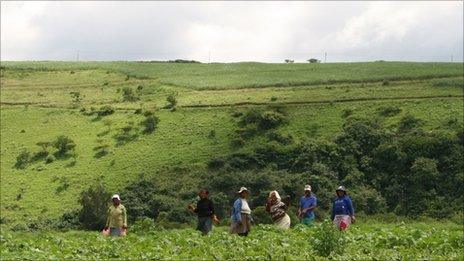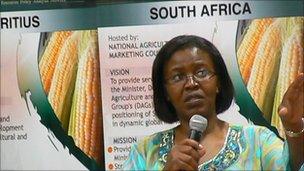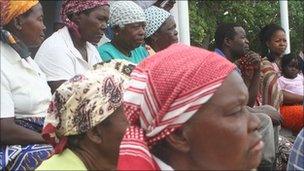Women are central to feeding Africa
- Published

Women in agriculture generally work longer and harder than men for less reward
In developing countries, more than 60% of women are directly involved in agricultural work, but very few gain access to information, training or supplies. More action and less rhetoric on this issue could put more food on the world's table and help drive economic growth, writes Pamela Whitby.
Lindiwe Majele Sibanda has agriculture in her blood.
One of five children, she grew up on a farm in Zimbabwe where her parents still live and farm today.
"Farming," says Ms Sibanda, who runs her own commercial cattle farm, "is a family tradition."
She admits, however, that cattle farming is one type of agriculture that it is possible to run remotely and she does this from her base in South Africa.
"You vaccinate, you put in place your programme and you get a good manager," she explains.
Having an extended family helps too, which is "the beauty of being an African".
Women contribute
She is among just 10% of women in Africa who own livestock and among the 1% of women who own land.
Ms Sibanda, who trained as an animal scientist in Egypt and the UK, is committed to improving the livelihoods of Africa's rural women through her work as chief executive of a food, agriculture and natural resources policy analysis network called Fanrpan.
The organisation on ensuring food security and alleviating poverty in Africa.
"Women are responsible for the lion's share of agricultural production and there are real benefits in getting our women farmers involved in influencing policy," she says.
She has a point.
According the United Nations Food and Agriculture Organisation (FAO), some 70% of the world's food is grown on farms of less than two hectares and these are tended largely by women.
Hard work
In sub-Saharan Africa, women grow as much as 90% of the region's food.
Yet despite the central role they play, the conditions they work in leave much to be desired.
For one, the working day of women is at least 50% longer than that of men.
In addition, some 75% of the essential work women do, such as planting, hoeing, weeding and harvesting, is done with the most rudimentary tools and little outside assistance.
What is more, government agricultural strategies, which facilitate access to information, training and farm inputs (seeds and fertilizer), have typically focused on increasing production of cash crops and are largely provided to men.

Lindiwe Majele Sibanda wants to improve the lot of women in agriculture
Women, meanwhile, have access to just 5% of such resources.
Little training
Another overlooked challenge is how the agricultural work environment affects the health of women, says Dr Saloshni Naidoo from the Department of Occupational and Environmental Health at South Africa's University of Kwa-Zulu Natal.
Dr Naidoo has been involved in research to assess the impact of inadequate training in using pesticides on female workers on small-scale farms.
In one study into pesticide safety, only 60 in 800 had received any training.
Of these women, almost 46% were the primary sprayers on their farm and just 18% had ever read a pesticide label.
"These are often in a foreign language," says Dr Naidoo. Besides, many of these women are illiterate.
Damaging work
Among the main findings of this study was one suggestion that spraying pesticides during the first three months of pregnancy was associated with reporting a spontaneous abortion.
In addition, owning a farm, working on a family farm or working for more than 10 years on one was associated with reports of infant death.
Muscular-skeletal problems from carrying heavy loads and frequently squatting and kneeling was another issue, with almost 43% of women reporting chronic back pain.
This is nearly twice the levels reported by male scaffolders in the Netherlands.
Yet pest management poses a significant threat to smallholder farmers; pre- and post-harvest losses in Africa average more than 40% as a result.
While many would argue for alternative methods of agriculture, one argument for responsible pesticide use is that it can reduce the backbreaking time spent by African women weeding their fields by as much 70%.
'Driving policies at home'
So looking to the future, what is being done about the plight of Africa's agricultural female workforce?
One seemingly significant development is that in October last year the African Union (AU) announced that 2010-2020 would be the "African Women's Decade" with the theme of "a grassroots approach to gender equality and women's empowerment".
A core focus is agriculture and food security, and the objectives set out are to increase women's access to land, farm inputs, credit and technology, while improving access to markets.

Women face different issues than men
AU member states have signed up to the programme's goals and are, they claim, driving policies at home.
Sounds good in theory, but there is often a yawning gap between the rhetoric of government officials and the reality on the ground.
"Governments will tell you that they subscribe to the AU's commitment to women, but the reality is that the access to farm inputs is still male driven and they are easier for men to obtain," says Ms Sibanda.
She points to the case of Marcia Mkandawire, 43, from Chimpedzu village in Malawi's capital, Lilongwe.
A mother of five, Ms Mkandawire had received a coupon under the government's input subsidy programme for the 2009-2010 season.
However, every time she turned up to redeem the coupon, the queues, she says, were "never-ending" and the vendors required more money than she could afford.
This meant she was unable to use the fertilizer, which led to a poor harvest of her maize crop, which meant less food for her children.
Training needed
"A major stumbling block is the lack of cohesion and communication, between the policy makers in the relevant government departments," says Ms Sibanda.
These include education, science and technology, labour and agriculture.
Even in South Africa, the continent's most developed market, this poses a problem.
There are, for example, 14 pieces of legislation governing pesticide use, under the control of several ministries.
"In South Africa we need a single regulatory body which controls pesticide use and sales of products," says Dr Naidoo, with training by either government or sales people that is focused on the end users and guided by regulation.
Ms Sibanda agrees, arguing that more could be done by agri-businesses, for example, in the way of training.
Ultimately, though, this needs to be driven by government and what is currently missing in the policy-making process is women, she says.
"The policies should be bottom up and they should be informed by the very people who need to implement these policies - namely the women."
But many rural women, who have not had formal education, often lack confidence to speak out.
'Central role'
To address this, the Gates Foundation has sponsored a programme called Women Accessing Realigned Markets (Warm), which uses community theatre to overcome the challenge of illiteracy and vocalise the issues they face.
Warm's project manager, Sithembile Ndema, says it empowers women to engage policy makers and development organisations in generating innovative solutions.
But with the FAO's food price index at its highest levels since the organisation began measuring food prices in 1990, clearly more needs to be done to boost the yields and incomes of women farmers.
According to the FAO, if women had access to the same farm inputs as the average male farmer, yields would increase by as much as 22%.
Many African countries are looking to the crop-driven "green revolution" of Asia for ideas, but Ms Sibanda points out that what Africa needs is a "rainbow" revolution.
"In Africa, we need milk in abundance, crops in abundance and meat in abundance," she says, "and women have a central role to play".
As a cattle farmer in a meat-loving region where demand for prime beef is rising, she should know.